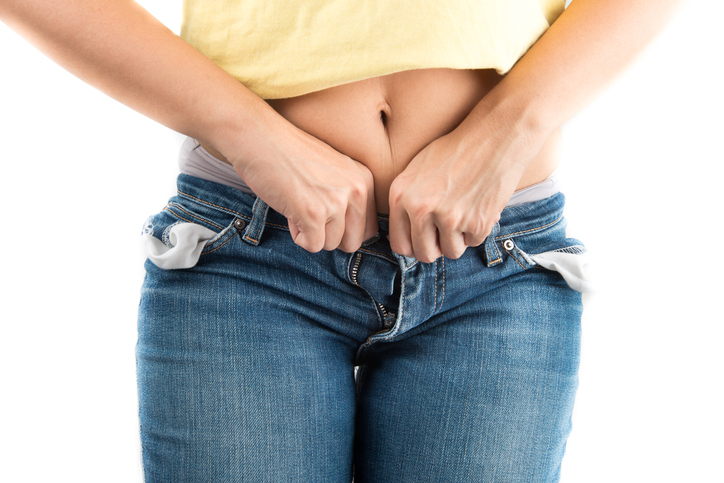Belly Fat? Here’s What To Avoid
Feeling you have tried everything? Here are some ideas that can help you lose that belly fat.

Belly fat is one of the most aggravating aspects of menopause for many women, but help is at hand.
We know that oestrogen dominance is a factor so hormone balance will go a long way to help by improving your progesterone levels.
There are also some everyday habits you may not have thought would affect that belly bulge.
Eating too fast
It takes about 20 minutes for your brain to get the message from your stomach that it’s full.
If you’re cramming food in too quickly, you’ll keep eating past the point your body needs.
This is another aspect of mindfulness, and often just a carry over habit from childhood or school, but remember that slow eaters take in fewer calories and that can prevent extra pounds piling on.
Eating while distracted
This can be summed up as mindfulness: paying real attention, so you notice your food, texture, flavour and chew with attention.
We have so many options now for distraction – a smartphone being the main culprit. So instead of scrolling to find new texts or emails, or just checking news headlines, be in the moment with your food and then the less likely you are to overeat.
Your waist will thank you.
Eating late
If you are a late night diner then you are not giving your digestive system time to do the work of burning off your meal.
Try to eat at least 3 hours before you go to bed because the later you take in calories, the fewer hours your body has to use them up.
Getting poor sleep
In one study, adults who slept less than 5 hours a night gained more belly fat than those who got more sleep.
Sleep is when our body renews itself and so aim for around 8 hours as we all have different needs.
But don’t go overboard to correct it as sleeping more than 8 hours a night can have the same belly-expanding effect.
Eating refined grains
The refined grains in products such as white bread and other processed foods are stripped of slow-digesting fibre, so your body digests it faster, raising your blood sugar.
Over time, this can lead to weight gain so try to choose whole-grain carbohydrates instead.
Diet drinks
One of the greatest mistakes when trying to lose weight is to swap full-sugar drinks for their diet version.
You would think that would keep your calorie count low and therefore curb weight gain, but scientific evidence says that is not the case.
Aspartame, the artificial sweetener in many diet drinks, actually increases belly fat, and usually found in sweeteners such as NutraSweet, Equal, and Canderel.
You do need to be a careful label reader as Aspartame is also known as AminoSweet. It is an ingredient in approximately 6,000 consumer foods and drinks sold worldwide.
Thirsty? Try more natural alternatives such as soda or sparkling water with a few drops of vanilla essence added, or mix with apple juice in a ratio of 10 parts water to 1 part apple or other fruit juice.
Skipping meals
When trying to lose weight it can be tempting to skip a meal but did you know opting out of breakfast makes you 4½ times more likely to be obese?
Going without a meal slows down your metabolism, which makes it more probable you’ll overeat later on when you’re hungry.
Focusing on low or fat-free food
It’s good to watch your fat intake, but foods that take out fat and sugar can often be higher in carbohydrates.
These foods can raise your triglycerides, increase your insulin sensitivity, and increase fat in your midsection.
If you want to reduce your risk of heart disease, it’s best to reduce your overall fat intake and swap saturated fats for unsaturated fats.
Dietary fat is necessary for absorbing certain vitamins, providing energy, and supporting cell function. It’s more important to focus on consuming healthy fats and limiting unhealthy fats than eliminating fat altogether.
Smoking
You already know smoking is bad for your overall health, but one of the worst effects of smoking relates to your belly.
The more you smoke then the more fat you store in your stomach, as opposed to your hips and thighs.
Not moving enough
The science is very clear – physical activity is the key to health and best to aim for 30 minutes of moderate-intensity movement every day.
Not only will you feel better, as exercise also improves mood, but your waistline will shrink even if your weight stays the same.
Being frequently stressed
Stress releases a hormone called cortisol into your body and high levels can lead to weight gain, especially the visceral weight you hold in your belly.
Stress cannot always be avoided, but we can do a lot to reduce it. Practice regular relaxation techniques such as deep breathing and meditation to help keep calm and curb stress levels.
Progesterone is the hormone that helps keep you calm so check your hormone levels to be sure yours are in balance.
Helpful information:
Reducing oestrogen dominance is a key factor at menopause for so many symptoms including weight gain.
You can have this condition with even quite low oestrogen levels if your progesterone is even lower so the aim is to have them in their natural balance.
Diet obviously plays a part in this, so if you struggle with that then here’s a plan that can help you with that.
https://anna.blog.wellsprings-health.com/variation-not-moderation-is-the-key-to-weight-loss/



















